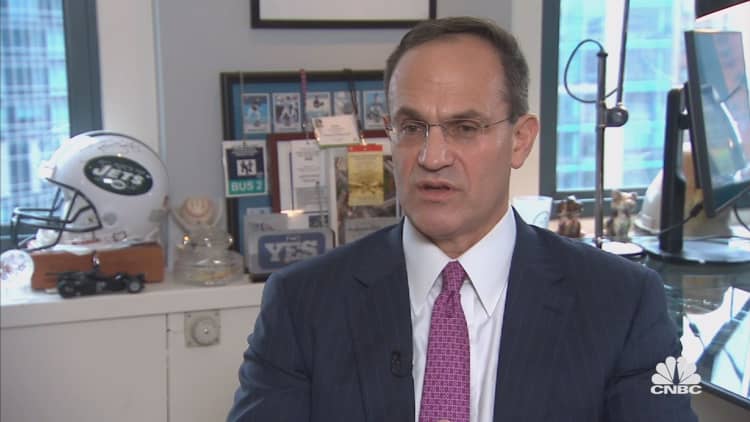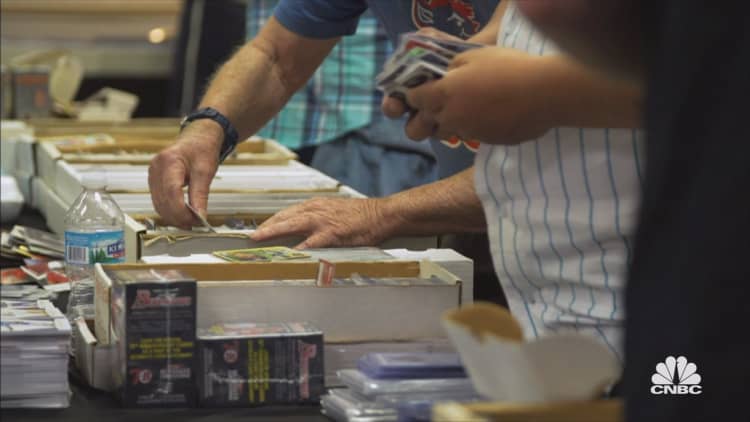We Americans love sports. The teams. The athletes. We just want to reach out and grab them. That is what sports memorabilia collecting is all about. And it is just the kind of passion that sports memorabilia scam artists are counting on.
"When you have this great emotional connection, and you have an ability to easily advertise your wares in a whole host of different ways that were formerly impossible, it makes it ripe for those that are less scrupulous," said Irwin Kishner, an expert on sports law, and a partner and executive chairman at law firm Herrick Feinstein in New York.
One of those less scrupulous people is Illinois auction house owner Bill Mastro, who is the subject of the next episode of CNBC's "American Greed."
Mastro helped to pioneer online auctions of baseball cards and other memorabilia. But unbeknownst to the thousands of collectors who used his services, many of the auctions were rigged. In 2013, he admitted using a system of so-called shill bidders whose sole purpose was to drive up prices and bring him higher commissions. He also tried to pass off a baseball that he falsely claimed was from America's first professional baseball team, the Cincinnati Red Stockings. And in a collector's sacrilege, he trimmed the edges of a rare Honus Wagner baseball card in order to make it look more attractive to bidders. Had they known the card was altered, it would have drastically reduced its value. But Mastro failed to disclose it.
Mastro's scams cheated collectors out of as much as $1 million on paper, though prosecutors say the total losses may never be known. He eventually pleaded guilty to a single count of mail fraud, and was released earlier this year after serving a 20-month prison sentence. His auction house is long gone. But the industry he helped create remains loaded with pitfalls.
"With the Internet, you are able to show pieces of memorabilia by just simply taking a picture and one really never knows if that picture is the actual item that you're going to purchase," Kishner said.
So how can you tell if the items you are bidding on are the real deal? Kishner offered some tips.
Do your homework
It is a recurring theme in any sort of collecting — or any purchase, for that matter. Know your seller.
"The most important aspect of doing diligence is to make sure that you're transactioning with a representative of a very well-known and respected company," Kishner said. "When you're dealing with well-known and well-reputed dealers of memorabilia, you're one step above."
This is not a foolproof safeguard, however. Remember, Mastro, the master of sports memorabilia fraud, had been in business for years and had a loyal following.
But a few well-placed internet searches can go a long way. Check out the company's record with the Better Business Bureau. Many states require auction houses to be registered or licensed, so check with the appropriate agency in the state where the auctioneer is based. Even a simple Google search can turn up potential red flags.
"The good ones are able to pass all those tests and you'll see that they've been in the business for a long time, that they have excellent reputations, and that they themselves have associated themselves with brands that are that are pre-eminent throughout the industry," Kishner said.
Trust, but verify
Demand evidence that the item you are thinking of purchasing is authentic. A certificate signed by a recognized authenticator is part of the item's intrinsic value. Without it, you can never be sure if the item is truly worth what you are paying for it.
"Authenticators are generally experts in their field," Kishner said. "You'll have experts that look at trading cards, you'll have experts that look at signatures, you'll have experts that look at different pieces of memorabilia from a different vantage."
Many reputable dealers will offer authentication guarantees of their own, and Kishner says that is a good start. Even better is authentication by a third party. In the world of sports memorabilia, James Spence Authentication (JSA) and Professional Sports Authenticator (PSA and PSA/DNA) are the most widely recognized authorities, but even reputable authenticators can make mistakes. A 2014 investigation by the Miami New Times found numerous instances of questionable authentications by the companies, in large part because of the hundreds of thousands of requests they process every year.
Neither company claims to be 100 percent accurate, but both say they go to great lengths to get it right.
For its part, JSA says it employs a three-step authentication process on every item, including, in some cases, video-spectral analysis. But the company cautions that in the end, authentication is a "subjective" process, and it offers no warranty against mistakes.
PSA says it employs "state-of-the art" methods and unbiased third-party analysts. For an extra fee, the company will "encapsulate" cards and other memorabilia in a tamper-resistant case. And the company guarantees that in most cases, it will refund the difference in value if an item's grade is later lowered.
Kishner says even the best authenticators can make mistakes, so you can never be 100 percent certain that the item is real. But the authentication process is essential to smart collecting.
"You're able to get to that level of what I'll call circumstantial evidence leading to near certainty."
Spotting the shills
Shill bidding — the process of using fake bidders to drive up the price — has been around for almost as long as auctions themselves. But online auctions — a favored market for sports memorabilia — can be particularly susceptible because of their anonymous nature.
"An average layperson engaged in a bidding process is not going to be able to tell unless you see the price rise in some sort of peculiar way, which is very hard to detect," Kishner said.

Many participants in Mastro's auctions had their suspicions, however.
"There would be a Ty Cobb, and the card would be sitting at a $2,000 value for two weeks," collector Jeffrey Lichtman recalled. "And I would then go on the computer, I would see the card, I wanted to buy it. So I put my bid in at, let's say $2,100. I would turn around and 15 seconds later I had been outbid. And it would happen time and time. It was almost like there was some maniac sitting behind a computer, inside the Mastro offices waiting for people to bid so they could top the bid. I knew immediately that something was off."
But the rigged auctions went on for years, and because Mastro Auctions was so dominant, serious collectors had few alternatives.
While law enforcement and industry self-policing have gotten better about spotting fraud, you can protect yourself by knowing your price and sticking to it. Don't let your emotions cloud your judgment. That is what Bill Mastro counted on for years, and it is a fair bet that there is another Bill Mastro out there waiting to do the same thing.
See how Bill Mastro turned simple pieces of cardboard into solid gold — and scammed thousands of collectors in the process — on an all new episode of "American Greed," Monday, Aug. 21 at 10 p.m. ET/PT only on CNBC.




